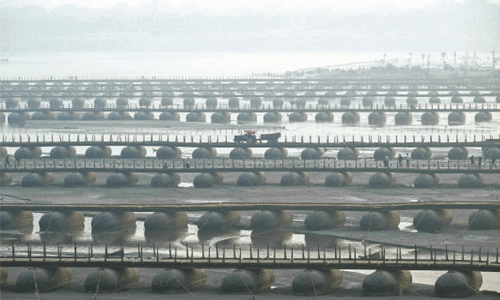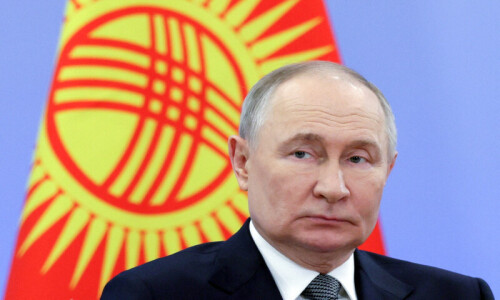
Jaipur, January 23, 2011.
‘Home Boy’ by H.M. Naqvi, the critically acclaimed Pakistani author, won the inaugural DSC prize for South Asian literature last night (January 22), at an hour-long ceremony, which included readings from all the short-listed writers at the close of the second day of the Jaipur Literature Festival. The prize at US$50,000 is among the worlds’ richest literary awards and is given for South Asian fiction, including translations.
The DSC Jaipur Literature Festival which is also sponsored by DSC, opened yesterday morning with a simple ceremony which included speeches by the festival directors, Namita Gokhale and William Dalrymple and the lighting of candles, in holders draped in marigolds! One of the great things about the literary festival is that the attendance is free. The festival is so popular that an audience of 7,000 people altogether attended the four concurrent sessions at the festival, every hour – compared to 2,000 last year. These sessions were held at different venues, including tents and lawns, in different sections of the Diggi Palace, a pale blue structure with arches and verandahs, built around courtyards and open spaces.
The advantage of the largest venue, the front lawn was that though the stage and seating area was covered by an awning, there was an open air area beyond with tables and chairs, where people could sit, drink tea, chat – and if they preferred, they could listen in to the event: it was there that I settled down for much of that first morning. Among others, I met various judges of the DSC prize, such as the lively and witty Amitava Kumar and the elegant Moni Mohsin – the latter was also in India for the launch of her new novel ‘Tender Hooks’ which revolves around the character of her famous book, ‘Social Butterfly’ and her world.
For the festival’s opening session, Nobel Prize winner Orhan Pamuk was interviewed by Chandrahas Choudhuri, author of ‘Arzee the Dwarf’ which was short-listed for the 2010 Commonwealth Writers prize. The discussion revolved largely around Orhan’s novels ‘My Name is Red’ and his more recent work, ‘The Museum of Innocence.’ Pamuk revealed that the former, which tells the story of miniature painters and a murder in the sixteenth century Istanbul, evolved because he once wanted to be a painter – and was also concerned about the disappearing cultural forms and art.
My own session “Two narratives, two nations”, chaired by Urvashi Butalia, revolved around the partition novels of my aunt Attia Hosain and my daughter Kamila Shamsie – Kamila read extracts from both novels followed by a lively Q&A. I was rather overwhelmed to find a packed audience, to the extent that there were people sitting on the floor in the aisles and the front. But it transpired that most sessions were similarly crowded. It was also good to run into an old friend, Martin Pick, an independent British publisher, who had been a popular figure in Karachi during the 1960s and 1970s when he was working with the Oxford University Press. He told me that he had helped set up a competition at the University of East Anglia for an unpublished first novel – the winner received a six-month fellowship at the University of East Anglia to complete the book.
Other sessions that day included Jung Chang and Jon Anderson talking providing a critical appraisal of Mao Tse Tung and I heard much praise of Siddharta Mukherjee’s work of non-fiction ‘The Emperor of Maladies’ – the New York-based surgeon has written a book on the history of cancer. At dinner I discovered he was extremely well-informed about classical sub-continental music too, and listened to him discussing thumri, khayal, gharana and ghazals with Ali Sethi who has a profound love of music and who sang wonderfully, the verses from Bulleh Shah at the close of day.
The second day of the festival, “Reporting the occupation” a discourse between three writers Rory Stewart, Jon Lee Anderson and David Finkel, proved to be one of the most interesting and incisive sessions of the day: it revolved around the duty and vision of reporters and writers in bringing a story, from war-riven areas ranging from Iraq and Afghanistan to Sri Lanka, with all its complexities and innuendoes, to the public. After lunch, there was a lively discussion “Imaginary Homelands” in which a panel chaired by Chandrahas Choudhury and consisting of writers who live in the UK or USA but whose families originally belonged to different regions – Ian Jack, (Scotland) Kamila Samsie, (Pakistan) Manjushree Thapa (Nepal), Marina Lewycha (Ukraine), Junot Diaz (Dominican Republic) – discussed literature, migration, and reclamation. There were also lively ‘in conversation’ session with Kiran Desai who talked about her work, her gestation as a writer as well as the difference in approach of her mother, Anita Desai. Kiran talked about how she writes reams and reams before she can ‘needle-pick’ the elements she needs for her story whileher mother writes with carefully thought out precision. Later Kiran Desai, Orhan Pamuk, Leila Abouleila and Nam Le took part in a panel discussion “Out of the West” chaired by Rana Dasgupta, on the relationship between the west and writers belonging to different parts of the world. The whole evening culminated with a musical performance where Ali Sethi and Salman Ahmed left the audience enthralled.
More soon...
Muneeza Shamsie, in Jaipur.













































